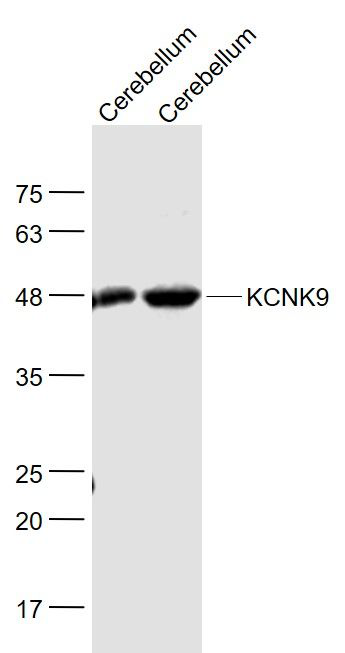产品货号 : mlR5933
英文名称 : KCNK9
中文名称 : TWIK相关酸敏感钾离子通道蛋白9抗体
别 名 : KCNK 9; KCNK-9; TASK3; Potassium channel subfamily K member 9; Acid-sensitive potassium channel protein TASK-3; TWIK-related acid-sensitive K(+) channel 3; Two pore potassium channel KT3.2; Short=Two pore K(+) channel KT3.2; KCNK9_HUMAN 研究领域 : 肿瘤 免疫学 神经生物学 通道蛋白
抗体来源 : Rabbit
克隆类型 : Polyclonal
交叉反应 : Human, Mouse, Rat, Chicken, Pig, Cow, Horse, Rabbit, Sheep,
产品应用 : WB=1:500-2000 ELISA=1:500-1000 IHC-P=1:400-800 IHC-F=1:400-800 ICC=1:100-500 IF=1:100-500 (石蜡切片需做抗原修复)
not yet tested in other applications.
optimal dilutions/concentrations should be determined by the end user.
分 子 量 : 40kDa
细胞定位 : 细胞膜
性 状 : Lyophilized or Liquid
浓 度 : 1mg/ml
免 疫 原 : KLH conjugated synthetic peptide derived from human KCNK9:21-120/374 <Extracellular>
亚 型 : IgG
纯化方法 : affinity purified by Protein A
储 存 液 : 0.01M TBS(pH7.4) with 1% BSA, 0.03% Proclin300 and 50% Glycerol.
保存条件 : Store at -20 °C for one year. Avoid repeated freeze/thaw cycles. The lyophilized antibody is stable at room temperature for at least one month and for greater than a year when kept at -20°C. When reconstituted in sterile pH 7.4 0.01M PBS or diluent of antibody the antibody is stable for at least two weeks at 2-4 °C.
PubMed : PubMed
产品介绍 : KCNK9 or TASK-3 (TWIK-related Acid sensitive K+ channel) is a member of the potassium channel family of proteins that contain two-pore domain and four transmembrane domains. These channels are characterized as leak K+ channels that are sensitive to changes in the extracellular pH. The physiological functions of TASK channels are largely unknown; it has been proposed that they may be involved in the regulation of breathing, aldosterone secretion and anesthetic-mediated neuronal activity. They were found to act in neurons' membrane potential and in resting K+ currents.
Function:
pH-dependent, voltage-insensitive, background potassium channel protein.
Subcellular Location:
Membrane; Multi-pass membrane protein
Tissue Specificity:
Mainly found in the cerebellum. Also found in adrenal gland, kidney and lung.
DISEASE:
Defects in KCNK9 are the cause of Birk-Barel mental retardation dysmorphism syndrome (BIBAS) [MIM:612292]. A syndrome characterized by mental retardation, hypotonia, hyperactivity, and facial dysmorphism.
Similarity:
Belongs to the two pore domain potassium channel (TC 1.A.1.8)
SWISS:
Q9NPC2
Gene ID:
51305
Important Note:
This product as supplied is intended for research use only, not for use in human, therapeutic or diagnostic applications.
产品图片












